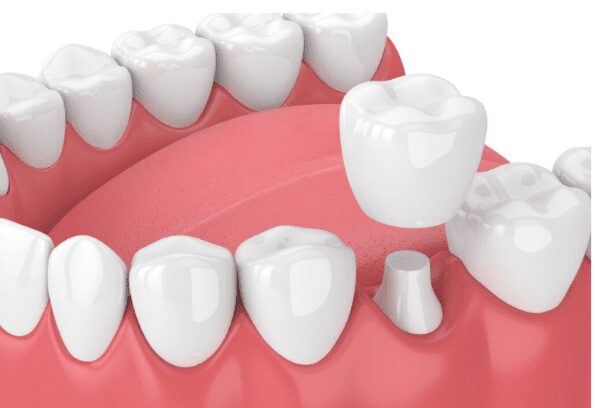Dental crowns are an essential restorative dentistry treatment that can preserve a tooth, restore its function, and enhance its appearance. Dentists use crowns on teeth that have suffered from damage, are weakened, or are aesthetically compromised. A tooth crown is reliable and will save a tooth from being extracted. Dr. Walter Mazzella is an experienced restorative dentist that can provide you with a dental crown in Ellicott City, MD to restore your oral health.

What Is a Dental Crown?
A dental crown is a tooth-shaped, custom dental restoration that dentists use to restore a tooth. It will completely encase the tooth to the gumline. A crown will effectively restore a tooth’s shape, size, strength, and appearance. We offer cubic zirconia dental crowns, which provide a durable yet natural-looking dental restoration.
What Are Dental Crowns Used For?
Dr. Mazzella uses dental crowns for a wide range of restorative and cosmetic dentistry purposes:
- Restoration of Damaged Teeth: Dental crowns are used to repair teeth that have been severely damaged by decay, fractures, or trauma. By encasing the tooth, the crown will restore the tooth’s structural integrity and prevents further damage.
- Protect The Tooth After Root Canal Therapy: Following root canal treatment, your dentist may use a dental crown to protect the weakened tooth and give it strength.
- Support for Dental Bridges: Dental crowns are used as anchors for dental bridges. They are placed on healthy adjacent teeth to support the false teeth in the bridge.
- Covering Discolored or Misshapen Teeth: Dental crowns can improve the appearance of discolored, misshapen, or stained teeth.
- Protection for Cracked Teeth: Cracked teeth can be vulnerable to further damage or infection. Dental crowns are used to protect and strengthen them.
- Implant Restoration: A dental crown is placed on a dental implant to replace single missing teeth effectively. This provides a natural-looking and functional solution to tooth loss.
The Dental Crown Procedure
The dental crown process can take up to two to three dental visits over a span of a few weeks. It involves preparing the tooth, taking impressions, placing a temporary restoration, and then placing the permanent crown. The steps in the dental crown process include:
Comprehensive Exam
During a thorough examination of your teeth and mouth, Dr. Mazzella will determine if a dental crown is the right course of treatment for your tooth. He will develop a treatment plan that will address all your oral health concerns and cosmetic goals.
Preparation of Teeth
At the first appointment, your dentist will prepare the tooth. He will take multiple impressions of your teeth during this appointment. The old dental crown or dental filling will be removed if present. To prepare the tooth, he will need to remove all decay or damaged portions and reduce the tooth in size to create room for the crown.
Temporary Dental Crown
In most cases, Dr. Mazzella will place a temporary tooth crown to protect the tooth and allow it function properly until your next appointment. You should only have to wear this for about two weeks, the time it takes to fabricate your permanent crown in a dental laboratory.
Final Placement of Dental Crown
At your last appointment, your dentist will secure the permanent dental crown. After removing the temporary cap, he will try on the new crown to ensure a proper fit and to make sure the color matches the surrounding teeth. Once you both are satisfied, the dental crown will be permanently bonded to the tooth. Strong dental adhesive is used to ensure it is secure. Your new restoration is then gently shaped, smoothed and polished.
How to Care for a Dental Crown
Taking good care of your dental crown will ensure that it lasts a long time. Here are some tips for caring for your dental crown:
- Practice Good Oral Hygiene: Brush your teeth and floss in between them every day. This will prevent gum disease and help to maintain the health of the surrounding teeth. Be gentle around the crown to avoid damaging the restoration.
- Avoid Chewing Hard Objects: Refrain from chewing on ice, hard candies, or other hard objects that will damage the crown.
- Limit Things that will Stain the Crown: Be mindful of foods and beverages that can stain your teeth and the crown. These include coffee, tea, red wine, and tobacco products.
- Use a Mouthguard: If you grind or clench your teeth at night, consider wearing a night guard to protect your crown and natural teeth from excessive wear.
- Visit Your Dentist: Continue to visit your dentist for regular check-ups and cleanings. This allows your dentist to monitor the condition of the crown and address any issues promptly.
